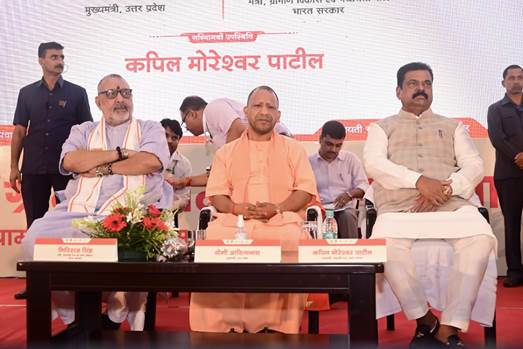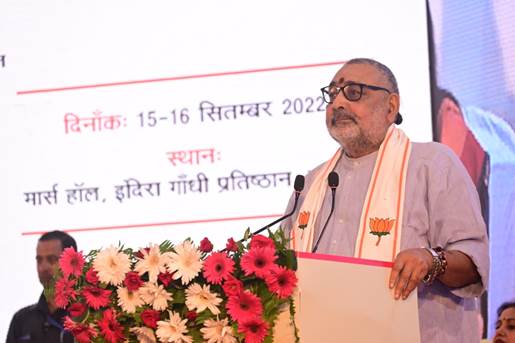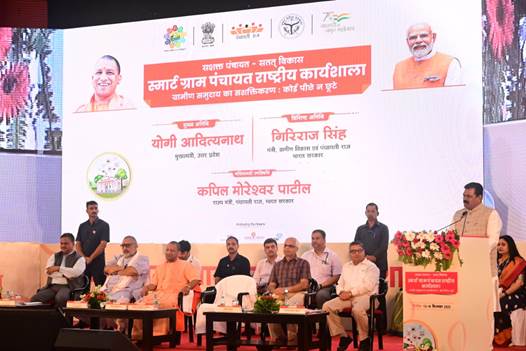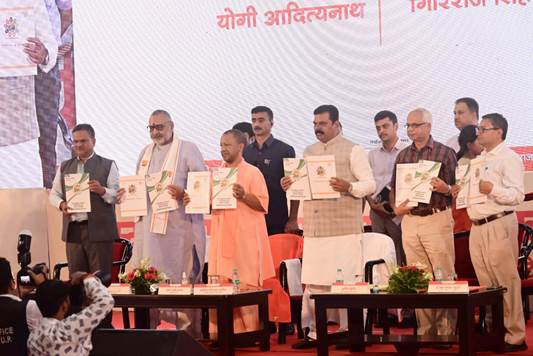Panchayati Raj Institutions have come a long way in adapting to technological advancements leading to greater transparency, responsibility and accountability: Giriraj Singh
To support the ‘Minimum Government, Maximum Governance’ vision at the third tier of Government i.e., Panchayats, by the means of technology, the Ministry of Panchayati Raj has organized the two-day Smart Village Panchayat Conference on ‘Empowering Rural Communities; Leaving No One Behind’ in Lucknow, Uttar Pradesh.
The inaugural session of the national level conference today was led by Union Minister for Rural Development & Panchayati Raj, Shri Giriraj Raj Singh, Chief Minister of Uttar Pradesh, Shri Yogi Adityanath and Minister of State for Panchayati Raj, Shri Kapil Moreshwar Patil.

In his inaugural address, Shri Giriraj Singh said that Panchayati Raj Institutions (PRIs) have come a long way in adapting to technological advancements. While describing ‘SMART Villages’, he mentioned that they entail systems and processes which are driven by technology leading to greater transparency, responsibility and accountability. Shri Singh laid emphasis on the role of Central and State Governments and Elected Representative in visualising and implementing existing technologies. The Minister praised the Gram Panchayats regarding the adoption of Government eMarketplace (GeM), PFMS interface, Gram Manchitra (spatial planning), drone technology and put weightage on ‘Entrepreneurship’ in rural India which shall further support the ‘Atma Nirbhar Bharat’ vision.

Speaking on the occasion, Shri Yogi Adityanath laid emphasis on the contribution of PRIs in Uttar Pradesh in driving India’s aspiration of becoming a 5 trillion-dollar economy. Shri Adityanath further mentioned that Smart Village creation is directly linked with self-sufficient infrastructure, responsible citizens and behavioural changes. He stressed on availability of high-speed internet for provisioning of various government and non-government citizen centric services. He stressed on the importance of four main pillars, which are also linked with eight subjects i.e., Good Governance for creation of Smart Panchayats i.e provisioning and enhancements of basic infrastructural facilities of all Gram Panchayats (GPs), increased transparency and public participation in day-to-day functioning of the GPs, speedy resolution of public grievances and strengthening of public service delivery, and setting up of Common Service Centres (CSCs) in all GPs and provisioning of uninterrupted free Wi-Fi facility.

Addressing on the occasion, Shri Kapil Moreshwar Patil talked about longevity of social, economic and environmental welfare at grass root level by leveraging ICT, Internet, GIS and Remote Sensing. He laid emphasis on the challenges such as demand-supply management that Panchayats shall face while adapting to digital infrastructure, growing population and inevitable rapid urbanization. To make the rural development efficacious it is necessary to devise a strategy/model for executing and monitoring the process. A specially designed suitable framework based on Cluster approach, Public Private Partnership (PPP) along with Citizen Participation on the grounds of Science, Technology, Engineering, Regulations and Management will play important role to build next generation smart villages, he added.
During the Inaugural session, Secretary, Ministry of Panchayati Raj, Shri Sunil Kumar apprised the participants on the importance of creating Smart Panchayats that are self-reliant and independent, in order to prevent the undue migration of young adults from rural India to cities in search of better job opportunities. Shri Kumar also mentioned that broadband infrastructure, digitisation (promoting digital service delivery) and educated manpower at village level lays the foundation of development. Examples of State level initiatives such as Village Level Entrepreneurs in Uttar Pradesh and Maharashtra, Smart Village – Smart Ward towards Smart Andhra Pradesh, Electricity generation of Odanthurai Panchayat in Coimbatore, and CCTV and biometric machines installation, air-conditioned classrooms, Wi-Fi coverage in Punsari Panchayat of Gujarat were cited in his address.

A book on ‘Localisation of Sustainable Development Goals (LSDG), Launch of e-learning module’ was released on this occasion.
This National Conference on Smart Village Panchayats, organised by the Ministry of Panchayati Raj in collaboration with the Panchayati Raj Department of Uttar Pradesh and Industry partners including CII, ASSOCHAM, COAI, marks a new beginning towards fostering digital transformation of rural areas. Smart Village Panchayat Exhibition has also been organised on this occasion.
Going forward, Panchayats which play crucial role for local governance at grassroots level would evolve as hub of economic activities and drive rural transformation towards achieving inclusive development, decentralized administration, good governance as well as towards achieving the Sustainable Development Goals (SDG) 2030 Agenda.

